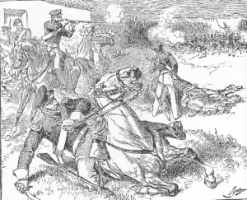On the 24th of April, 1846, U.S. Army General Zachary Taylor sent Capt. Seth Thornton and 63 dragoons ostensibly on a reconnaissance mission to ascertain the crossing above river of a sizeable (1,600) Mexican force under the command of Gen. Anastacio Torrejon.
Taylor and the army had crossed the Arroyo Colorado weeks earlier and established a disembarking site for supplies at Brazos-Santiago. He had also ordered the construction of an earthen fort on a bend in the river facing Matamoros across the Rio Grande.
But, still, no confrontation that would allow the U.S. government to claim that Mexico had attacked its soldiers had materialized despite the obvious provocations of the occupation and the taking of Mexicans' land north of the river, until then a mere geographical feature and not a border.

According to Capt. William Hardee, an officer with Thornton detachment, Taylor's orders "as I understood them, were to ascertain if the enemy had crossed the river above our camp, and to reconnoiter his position and force."
Taylor and the army had crossed the Arroyo Colorado weeks earlier and established a disembarking site for supplies at Brazos-Santiago. He had also ordered the construction of an earthen fort on a bend in the river facing Matamoros across the Rio Grande.
But, still, no confrontation that would allow the U.S. government to claim that Mexico had attacked its soldiers had materialized despite the obvious provocations of the occupation and the taking of Mexicans' land north of the river, until then a mere geographical feature and not a border.

According to Capt. William Hardee, an officer with Thornton detachment, Taylor's orders "as I understood them, were to ascertain if the enemy had crossed the river above our camp, and to reconnoiter his position and force."
Hardee said no mention was made in the official orders of confronting the enemy or engaging them in battle. However, Thorton seems to have been under other orders from Taylor.
Hardee notes in a letter he wrote to Taylor on April 26 as a prisoner of the Mexican forces in Matamoros two days after Thornton was ambushed, that on the 25th "all his inquiries along the way tended to the conviction that the enemy had crossed in strength."
"About 23 miles from our camp (Rancho Carrizitos) our guide became so satisfied of this fact that he refused to go further and no entreaties on the part of Capt. Thornton could shake his resolution."
That guide was a spy named Chepita, a servant of Col. Henry L. Kinney, a contraband runner and founder of Corpus Christi, who tagged along with his employer who had signed on with the army to procure supplies for Taylor and provide the general with intelligence from behind enemy lines.
 The result of Thornton disregarding Chepita's information – and Hardee's reason to be perplexed with his commander's decision to confront the enemy in apparent contradiction to his orders – was the capture of 46 U.S. soldiers, the death of 11 dragoons, and the wounding of six others. The survivors, like Hardee, were taken to be incarcerated in Matamoros by Mexican troops.
The result of Thornton disregarding Chepita's information – and Hardee's reason to be perplexed with his commander's decision to confront the enemy in apparent contradiction to his orders – was the capture of 46 U.S. soldiers, the death of 11 dragoons, and the wounding of six others. The survivors, like Hardee, were taken to be incarcerated in Matamoros by Mexican troops.Thornton’s men had tried to break off, attempting to outflank the Mexican lines and ride to safety – a move nullified by the Mexican cavalry that closely shadowed them. As he looked to and fro, trying to find his way, Thornton’s horse was suddenly shot from beneath him, and the American officer found himself pinned under the beast and he was one of the captured after Hardee surrendered the survivors.
What many local history buffs were not aware of was that the army (that included Taylor), ordered Thornton court martialed, blaming him for the death of the U.S. soldiers and the capture by the enemy of the rest, including himself.
News of his acquittal reached Matamoros – then under U.S. occupation – after August 26, and the editors were joyous at the outcome.
"It will be gratifying to the Army, and especially to the large circle of this gallant officer's friends, to learn that intelligence has been received in this city, of his acquittal by the court martial of all charges upon which he was tried.
"Indeed we believe that the joy at his acquittal will be no grater than was at the surprise his trial...
"In a spirit of chivalrous obedience to his orders, he was ambuscaded by a superior force; with a soldier's promptness, he made an effort that would deserve success, for its intrepid coolness – its failure was the fate of war, and in the estimation of his comrades, detracts nothing from the brilliance of that attempt. Throughout the army, as far as we have heard, there are none that speak lightly of Capt. Thornton, or deny him the meed, which the soldier prizes highest."





1 comment:
The scumbag Rene Oliveria will get the same fate, with the corruption in this City anything can happen.
Post a Comment